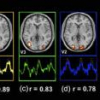Free Online Productivity Tools
i2Speak
i2Symbol
i2OCR
iTex2Img
iWeb2Print
iWeb2Shot
i2Type
iPdf2Split
iPdf2Merge
i2Bopomofo
i2Arabic
i2Style
i2Image
i2PDF
iLatex2Rtf
Sci2ools
114
click to vote
ISBI
2008
IEEE
2008
IEEE
An information-based clustering approach for fMRI activation detection
Most clustering algorithms in fMRI analysis implicitly require some nontrivial assumption on data structure. Due to arbitrary distribution of fMRI time series in the temporal domain, such analysis may mislead and limit the detector's performance. In this work, the authors exploited the application of an information-based clustering algorithm (Iclust) which could avoid these assumptions and provide many other benefits, such as no cluster shape restriction, no need of a prior definition about similarity measure, and the ability of capturing both linear and nonlinear dependence. Results from both artificial and real fMRI data indicated that the proposed framework could achieve better spatiotemporal accuracy, and enabled the exploration of fine functional distinction of the human visual system in accordance with its well-known anatomy organizations.
FMRI Time Series | Information-based Clustering Algorithm | ISBI 2008 | Medical Imaging | Real FMRI Data |
Related Content
| Added | 20 Nov 2009 |
| Updated | 20 Nov 2009 |
| Type | Conference |
| Year | 2008 |
| Where | ISBI |
| Authors | Lijun Bai, Wei Qin, Jimin Liang, Jie Tian |
Comments (0)

